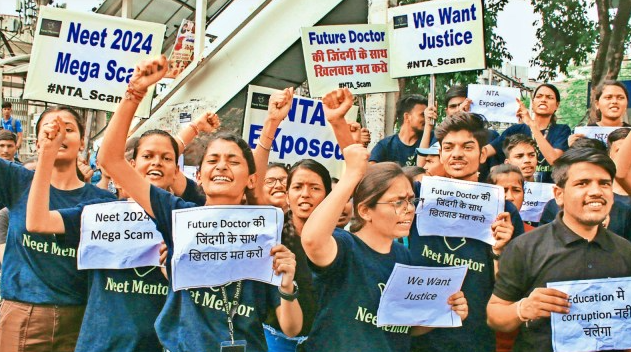Hyperpoliticisation of Indian Higher Education (GS Paper 2, Education)

Introduction:
- The landscape of higher education in India has long been intertwined with political agendas, a trend that has intensified in recent times, influencing various facets of academic life and institutional integrity.
- Political motivations have historically played a significant role in the establishment, governance, and functioning of educational institutions across the country.
Political Influence on Indian Higher Education:
- Politicians have historically established colleges and universities as a means to bolster their political careers, leveraging educational institutions to cultivate support among constituents and shape public opinion.
- Moreover, the socio-cultural demands of the electorate often dictate the establishment of educational institutions, reflecting the diverse and complex nature of Indian society.
- Governments, both at the state and national levels, strategically position educational institutions to cater to specific socio-cultural demographics, sometimes at the expense of academic autonomy and integrity.
- This politicisation extends to appointments and administrative decisions within universities, where political considerations may supersede qualifications and merit.
- Instances of universities being renamed for political reasons are not uncommon, with such changes often reflecting shifts in political power or ideologies.
Consequences of Hyperpoliticisation:
- The hyperpoliticisation of Indian higher education carries significant consequences for academic freedom, institutional integrity, and global reputation.
- Political interference poses a threat to academic freedom, potentially stifling diverse viewpoints and open discourse within university settings.
- This erosion of academic freedom not only compromises the quality of education but also undermines the credibility and objectivity of academic research.
- Moreover, a politicised academic environment may deter talented individuals, both faculty and students, from enrolling or working in Indian institutions, hindering the country's aspirations to become a global leader in higher education.
- The dominance of political agendas in academic discourse can lead to a narrowing of perspectives and a reluctance to explore alternative viewpoints, thereby stifling intellectual diversity and innovation.
- Additionally, excessive politicisation can result in disruptive student activism, further complicating the academic environment and impeding institutional functioning.
Mitigating Political Interference:
- Addressing the hyperpoliticisation of Indian higher education requires concerted efforts to strengthen institutional autonomy, uphold academic freedom, and depoliticise governance structures.
- Strengthening institutional autonomy can mitigate undue political influence by reducing dependence on government funding and promoting decision-making processes based on academic merit and integrity.
- Clear policies should be established to protect academic freedom and foster an environment conducive to free discourse, research, and intellectual inquiry.
- Furthermore, the depoliticisation of governing bodies, including transparent and merit-based selection processes for key positions, can help insulate universities from political pressures and ensure decisions are made in the best interests of the institution and its stakeholders.
- Additionally, mechanisms should be put in place to safeguard student union autonomy and empower oversight bodies to address complaints of political interference and academic freedom violations effectively.
Conclusion:
- As India seeks to enhance its higher education landscape and position itself as a global knowledge hub, addressing the hyperpoliticisation of academia is imperative.
- By fortifying institutional autonomy, upholding academic freedom, and depoliticising governance structures, India can create a conducive environment for academic excellence, intellectual diversity, and innovation.
- It is through these measures that Indian higher education can fulfil its potential as a driver of societal progress and economic development in the 21st century.


